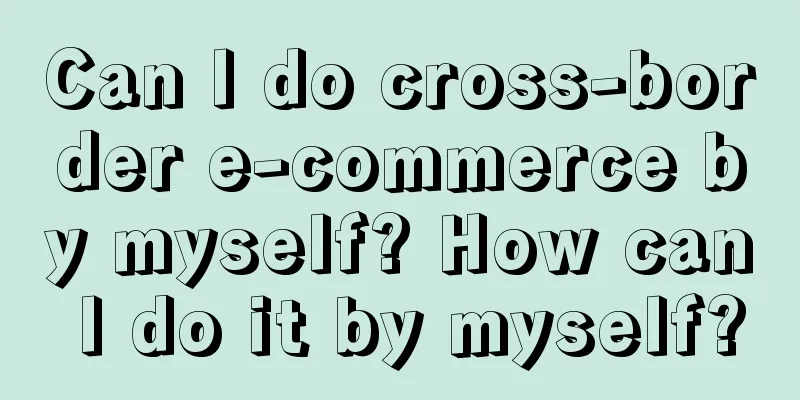Can I do cross-border e-commerce by myself? How can I do it by myself?

|
When it comes to cross-border e-commerce, many people think that this definitely requires a large team to do it, so, if an individual is weak and powerless, can he do it himself? This question is also what many small businesses want to know. After all, everyone also wants to enter this market, so they want to understand it. How do you do it yourself? Of course, for beginners, there are only a few cross-border platforms, and the threshold is relatively low compared to domestic e-commerce. For inexperienced people, even if they are slow to get started, they may be able to place orders within a month. Secondly, for those who have not engaged in cross-border e-commerce, many people think it is a high-end industry, and many people also think it is something that only large manufacturers can participate in. In fact, it is not as high-end as you might imagine. Among cross-border sellers, most are small and medium-sized sellers, with a team of less than 5 people. Many are even husband-and-wife shops or part-time individuals, so it is completely possible for a single person to operate it. And it is completely fine to do it as a side job in your spare time. Also, many newbies ask: Can I do this if I don’t know English? Of course, cross-border transactions do not require customer service like domestic transactions. Buyers rarely chat when shopping and will place an order if they see something they like. If they encounter an inquiry, they only need to open the translation software and copy and paste the chat history. Finally, if you plan to do cross-border business, here are some suggestions: 1. Be familiar with the platform rules. After choosing a platform, you must have a sufficient understanding of the rules. The degree and depth of your familiarity with the rules largely determines whether you can use the store well. 2. Learn more. There are still many ways in this industry. If you don’t have someone to guide you, you may take many detours. It is recommended to find someone to guide you. Alternatively, you can find some courses to learn more and try to avoid detours. 3. Focus. Human energy is limited. Don’t think about making too many products. Focus on subcategories or a few products. There are many platforms. Newbies should not make too many platforms. Otherwise, it will be counterproductive. After you are familiar with the platform and can do it well, you can make other brands or explore more markets. 4. Find a circle to get to know more peers, learn to communicate with them, and get more industry information. This will be of great help to your e-commerce business, because you are doing it alone and cannot keep yourself in the world. Making more friends in the same industry and communicating more can give you more ideas and more development directions. Therefore, cross-border e-commerce losses can be handled by yourself, there is no problem at all. In fact, cross-border e-commerce platforms are not as responsible as domestic platforms. Therefore, there are still many opportunities for everyone. If you really want to do it, you must learn more about the platform you want to join. |
<<: Do Shopee's newbie tasks count on Saturdays and Sundays? What tasks are there?
>>: Why is there no sound on Shopee Chat? What's wrong?
Recommend
What should data analysts do when they are always faced with various difficulties?
Students who work with data may encounter many dif...
The conversion rate of sales notes is low. How to break the deadlock?
For small and medium-sized brands, the low convers...
The plastic turtle in the live broadcast room controls young people
The live broadcast room of "opening turtles&q...
Does Pop Mart need to tear off the “blind box” label?
This article mainly analyzes the current status of...
How to extend Amazon Outlet promotion? How to set it up?
Amazon Outlet, which clears out inventory at price...
From Lei Jun’s latest speech, I summarized 3 inspirations for doing “private domain”
This article deeply analyzes the inspiration given...
Why is there a low volume of orders on Amazon? What should I do if there are few orders?
The purpose of opening an online store is to make ...
Bilibili has over 100 million short videos, why are they all ghost videos?
On Bilibili, a single video with over 100 million ...
Damn! I was seduced by these 6 brands | Monthly Case
In an era of increasingly fierce business competit...
How to use the mobile payment virtual card? What are the rules of use?
With the rapid development of technology, mobile p...
How to pay for eBay advertising? How to advertise on eBay?
For eBay merchants, they need to do a good job of ...
Tencent increases investment in local life, with video accounts taking the lead
Entering the local life, WeChat Video Account crea...
Kimi's way of making money is so abstract...
Have you used Kimi recently? Have you noticed the ...
How many days will Amazon be closed for Chinese New Year? How to ship during holidays?
During the Chinese New Year, many e-commerce platf...
How long does it take for Amazon's reserved quantity to become available for sale? What is the purpose of the reservation?
On the Amazon platform, sellers can choose to rese...









